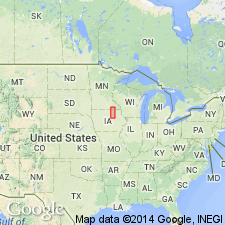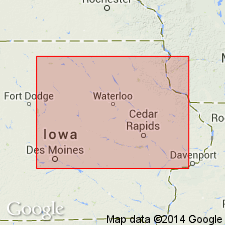
- Usage in publication:
-
- State Quarry Limestone Member
- Modifications:
-
- Revised
- AAPG geologic province:
-
- Iowa shelf
Summary:
Reduced in stratigraphic rank and assigned as a member of the Lithograph City Formation (new) of Cedar Valley Group (rank raised) in southeast and east-central IA, Iowa shelf. Shares lateral facies relationship with the three northern members of Lithograph City Formation. Assigned member status because brachiopod and conodont faunas indicate correlation with the northern section. Type locality designated in SW SW NW SE sec 8, T80N, R6W, Johnson Co, in the old State Quarry northeast of North Liberty. Is dominated by skeletal calcarenites, packstones, and grainstones. Fossils echinoderms, brachiopods (listed), branching stromatoporoid, corals, fish teeth. Pelletal calcarenites and stromatoporoidal calcirudites also occur. As much as 40 ft thick. Unconformably overlies Coralville and Rapid Members of Cedar Valley. Top is erosionally truncated by Pennsylvanian and Quaternary strata. Is equivalent to Idlewild Member of Lithograph City. Cross sections; graphic sections. Of Devonian age; Middle Devonian-Late Devonian boundary lies somewhere in Lithograph City.
Source: GNU records (USGS DDS-6; Denver GNULEX).

- Usage in publication:
-
- State Quarry Member
- Modifications:
-
- Revised
- Overview
- AAPG geologic province:
-
- Iowa shelf
Summary:
Stratigraphic rank reduced from formation to status as a member of Lithograph City Formation (named) of Cedar Valley Group (revised). Reasons for change of status are "conodont and brachiopod biostratigraphy, stratigraphic position, and physical evidence for intergradation with Andalusia Member" (new) of Lithograph City in a core 21 km southeast of type (which is at old state quarry on Iowa River valley 10 m north of Iowa City, Johnson Co). Restricted to Johnson Co where it forms broad channels 1 to 1.5 km wide incised into Coralville and Little Cedar (named) Formations of Cedar Valley Group. Characterized by fossiliferous calcarenites and calcilutites. Skeletal calcarenites (packstones and abraded grainstones) predominate at most localities and they are cross-bedded in part. Skeletal calcilutites present near channel margins. Fish bone lags near base. May be as much as 12 m thick. Fossils: conodonts of INSITA fauna (Middle Devonian, late Givetian) and is correlated with Lowermost ASYMMETRICUS Subzone (Late Devonian, Frasnian), echinoderm debris, brachiopods, stromatoporoids, rugosans, favositids, auloporids, gastropods, nautiloids, spirorbids, ostracods, trilobites, calcareous algae, forams. Developed locally near shelf margin during erosional interval following deposition of upper Coralville in relatively agitated water--probably marine tidal channel. Nomenclature charts, graphic sections. Forms upper part of the Devonian in this area.
Source: GNU records (USGS DDS-6; Denver GNULEX).
For more information, please contact Nancy Stamm, Geologic Names Committee Secretary.
Asterisk (*) indicates published by U.S. Geological Survey authors.
"No current usage" (†) implies that a name has been abandoned or has fallen into disuse. Former usage and, if known, replacement name given in parentheses ( ).
Slash (/) indicates name conflicts with nomenclatural guidelines (CSN, 1933; ACSN, 1961, 1970; NACSN, 1983, 2005, 2021). May be explained within brackets ([ ]).

